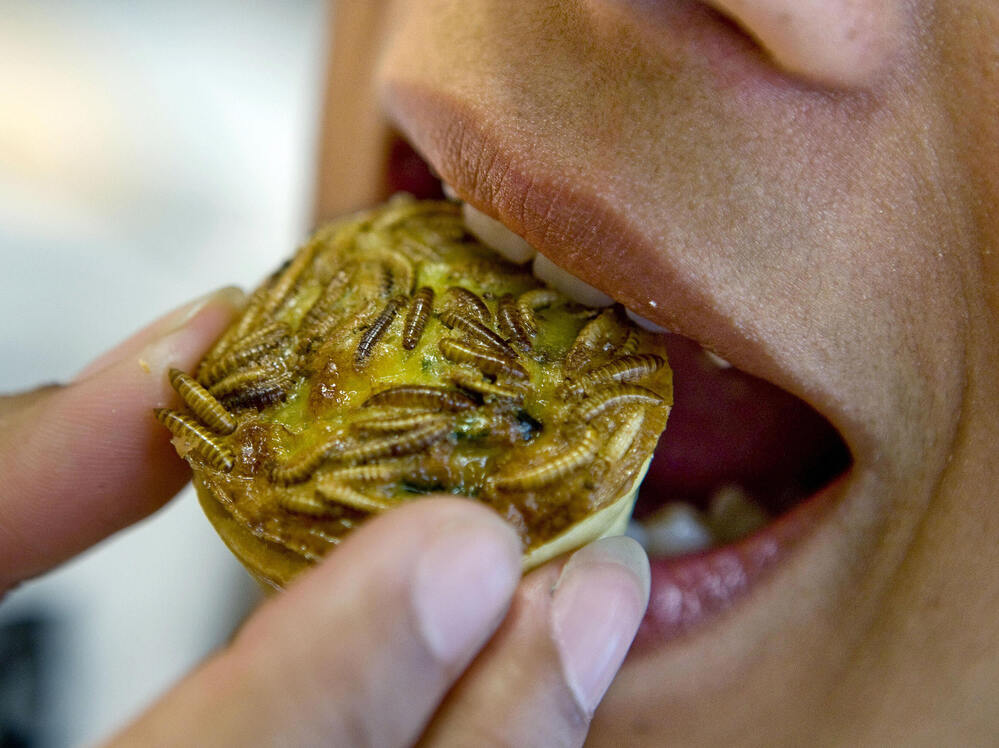 Enlarge image i
Enlarge image i A woman takes a bite of a mealworm pie in the Hague, Netherlands.

A woman takes a bite of a mealworm pie in the Hague, Netherlands.
Want to eat sustainably? Then eat bugs.
That's the word from the Dutch, who are doing their best to make a scientific case for the environmental benefits of insect proteins. Reduce greenhouse gases? Check. Produce more edible protein while using less land than more traditional livestock? Check.
That last one's an easy target; livestock take up about three-quarters of the world's agricultural land. And livestock production is also a major source of greenhouse gases, accounting for about 15 percent of emissions caused by human activity. (See our hamburger infographic for more details.)
But no one had run the numbers on bugs as livestock, until now.
The bugs in question are mealworms, actually larvae of the mealworm beetle, Tenebrio molitor. Mealworms are no strangers to Americans; they're common in nature, often used as fishing bait, and sold in pet stores as food for reptiles and fish. But most people don't consider snacking on the wriggling tan larvae themselves.
In order to persuade those of us who still savor a medium-rare steak, Dennis Oonincx, a graduate student at Wageningen University, has been hard at work calculating the environmental impact of meat production from mealworm farming. He measured land use, energy needs, and greenhouse gas emissions, and published his results in the journal PLOS ONE.
When it came to land use and effect on greenhouse gases, the mealworms soundly beat dairy production, pork, chicken and beef. The mealworms needed just 10 percent of the land needed to produce an equivalent amount of beef, including the land needed to grow feed grains and forage. (Mealworms happily feed on grains and carrots.)
But it took more energy to produce a kilo of bug protein than it did to get edible protein from milk or chicken. Indeed, the tiny critters were more on par with pork or beef. That may be because mealworms need to be warm to grow. More than half of the bugs' energy use went for gas heat and electric light. The other half went for production and transport of carrots and grain.
Undaunted, Oonincx and his colleagues conclude that mealworms "produce much less [greenhouse gas] and require much less land, than chickens, pigs and cattle. With land availability being the most stringent limitation in sustainably feeding the world's population, this study clearly shows that mealworm should be considered as a more sustainable alternative to milk, chicken, pork, and beef."
You may not be convinced. But in the Netherlands, at least one restaurant has featured mealworms as part of its bug buffet. (Teri Schultz covered the feast earlier this year for The Salt.) The diners gave rave reviews.
And if you're not ready to eat bugs, farmed salmon sure is. Aquaculturists are experimenting with using ranched flies as food in commercial fish farming. They're also under consideration as emergency food for refugees.
How to Stop Being a Vegetarian: Eating Meat Again Suggestions on how to eat meat again after being a vegetarian. Includes tips that can make the transition easier on your body. Topic Galleries -- dailypress.com Topic galleries provide easy access to stories and photos about people, places, organizations, events and subjects of interest to you. They bring together rich ... Beat Kidney Disease Cure your kidney disease the natural way ... Men will never exp 00004000 erience the pain of giving birth but it does not mean that they don't have any possibility ... Beat Generation - Wikipedia, the free encyclopedia The Beat Generation was a group of American post-World War II writers who came to prominence in the 1950s, as well as the cultural phenomena that they both documented ... Vegetarianism - Wikipedia, the free encyclopedia Vegetarianism is the practice of abstaining from consumption of meat (red meat, poultry and seafood). It may also include abstention from by-products of animal ... How Meat Contributes to Global Warming: Scientific American Producing beef for the table has a surprising environmental cost: it releases prodigious amounts of heat-trapping greenhouse gases barfblog safe food from farm to fork My favorite food safety-related app is Poop the World its a bit like playing Tony Hawk Pro Skater with, uh, poops. The opening screen says, Get started! Earth and Environment - Telegraph - Telegraph.co.uk - Telegraph ... Earth is your source for environmental and green news, with information on global warming, pollution, green living and recycling, as well as tips on how to cut your ... Providence Journal Rhode Island news, sports, weather & more ... Providence Journal: Your 24-hour source for Rhode Island & Southeastern MA breaking news, sports, business, politics, entertainment, weather, traffic & more Healthy Living - How To Information eHow.com Healthy Living: Discover how to lose weight by drinking clean purified water. Find tips on staying healthy by eating foods from low fat and low carb diets to gluten ...
No comments:
Post a Comment